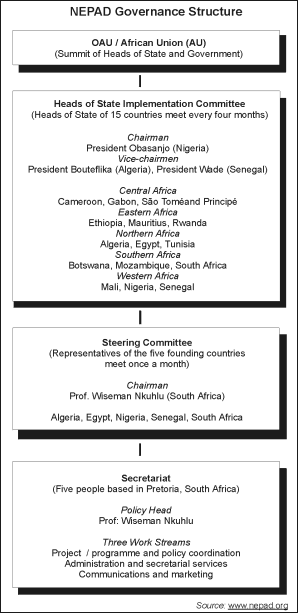
|
|
1. Profiling NEPAD |
| |
On 11 July 2001 the Organisation for African Unity (OAU) Summit approved the New African Initiative (NAI), born from the merger of the Millennium Partnership for Africa’s Recovery Programme (MAP) and the Omega Plan. The Heads of State and Implementation Committee meeting in Abuja, Nigeria on 23 October 2001 agreed on the New Partnership for Africa’s Development (NEPAD), finalised the policy document and accepted the governing structure. This launched the implementation phase of the initiative.
Conceived and developed by African leaders, NEPAD is a ‘comprehensive integrated development plan that addresses key social, economic and political priorities for the continent’. It entails a commitment by African leaders to African people and the international community to place Africa on a path of sustainable growth, accelerating the integration of the continent into the global economy. It calls on the rest of the world to partner Africa in her own development based on her own agenda and programme of action.
|
|

|
1.1 Goals
NEPAD aims to:
- promote accelerated growth and sustainable development
- eradicate widespread and severe poverty
- halt the marginalisation of Africa in the globalisation process.
The envisaged outcomes are:
- Economic growth and development and increased employment
- Reduction in poverty and inequity
- Diversification of productive activities, enhanced international competitiveness and increased exports
- Increased African integration
To drive the achievement of these goals NEPAD has set up five workteams:
- Peace and Security - South Africa, with the OAU
- Economic and Corporate Governance - UNECA
- Infrastructure – Senegal with the ABD
- Agriculture and Market Access - OAU
- Financial and Banking Standards - ADB with Nigeria.
In addition, Algeria has declared an interest in the human development sector while Egypt has a role in the market access and market diversification workteam.
1.2 The Governance Structure
The governance structure aims to:
- strengthen Africa’s capacity to lead her own development and improve coordination with development partners
- ensure capacity to lead negotiations on major development programmes requiring continent wide coordination
- accelerate implementation of major regional development cooperation agreements and projects already approved or in the pipeline
- strengthen Africa’s capacity to mobilise additional external resources for her development.
|

|
| NEPAD Steering Committee Members |
| Country |
Representative |
| Algeria |
Amb M"hamed AchacheAmb Rabah Hadid |
Egypt |
Amb Mona OmarAmb Raouf Saad |
Nigeria |
Amb Isaac Aluko-OlokonHC Tunji Olagunju |
Republic of South Africa |
Prof Wiseman NkuhluMr Smunda Mokoena |
Senegal |
Dr Cherif Salif SyMme Gnounka Diouf |
1.3 Implementation process
The secretariat will coordinate production of business plans for the priority areas:
- Political governance including Peace and Security, and Conflict Prevention, Management and Resolution
- Economic and corporate governance including the measurement of economic governance performance and a peer review mechanism
- Infrastructure including information and communication technology (ICT), water and sanitation, transport and energy
- Agriculture and market access including harmonising standards to encourage intra African trade, enhancing trade capacity through diversification and adding value, exchange rate management and encouraging private sector engagement with NEPAD, and creating uniformity and rationalisation by developing standard protocols and guidelines for negotiating international agreements and rationalising regional economic initiatives.
- Human development including health and communicable diseases, education and poverty eradication
- Capital flows including mobilising domestic resources, maximising private capital flows, reforming official development assistance (ODA) and identifying goals, criteria and mechanisms for debt reduction.
These plans, or draft versions, were presented for approval by the Heads of State Implementation Committee (HSIC) at its meeting on 25 – 26 March in Abuja. The final versions will be presented to the African Union (AU) Summit in July in South Africa. The programme will also be presented to the G8 Summit in June in Canada.
1.4 What makes it special?
NEPAD is a project of the African Union (AU), lead by mandated African leaders, driving an initiative that is African developed, managed and owned, with participating African countries accepting commitments and obligations in their own interests without externally imposed conditionalities.
In providing the overall strategic framework for Africa’s development agenda it will also align itself with work being done by SADC and other regional institutions. The initiative will seek to establish linkages and synergies with existing initiatives rather than to duplicate, replace or compete with them.
(Based on: NEPAD Policy Document; NEPAD in Brief; Rapporteur’s Report, Work In Progress 1203 all at www.nepad.org.
Click on ‘Recent Updates’. The NEPAD website and the SARPN website www.sarpn.org.za have more information on the origins of NEPAD, its structures, programmes and plans.)
|
| |
|






